#writing industry
Text
Submitted my first short story to be professionally published today.
In celebration I'm going to ask you other writers:
#No i'm not biased towards one of the options#I don't know why you would ask#writing#writblr#publishing#short stories#creative writing#writing industry#poll
8 notes
·
View notes
Text
On Supporting Artists
We all need to get better about supporting artists. Both on an individual level and a structural level. We are currently living through a time of change - though that is broadly true of any period of history; humans create change as naturally as breathing. But some of the specific changes I see happening now have a lot of potential to radically change how we view, make, and consume art, and it’s up to us to make sure those changes are positive ones.
Read the rest (for free!) over on my Kofi!
#ame talks#support artists#ai fuckery#writing industry#creative industry#just to say: all my essay/blog things are always free on Kofi#if you want to tip it is appreciated#but this is more me getting thoughts into the world than creative work that I feel comfortable charging anyone to read
3 notes
·
View notes
Text
So, there's a dirty little secret in indie publishing a lot of people won't tell you, and if you aren't aware of it, self-publishing feels even scarier than it actually is.
There's a subset of self-published indie authors who write a ludicrous number of books a year, we're talking double digit releases of full novels, and these folks make a lot of money telling you how you can do the same thing. A lot of them feature in breathless puff pieces about how "competitive" self-publishing is as an industry now.
A lot of these authors aren't being completely honest with you, though. They'll give you secrets for time management and plotting and outlining and marketing and what have you. But the way they're able to write, edit, and publish 10+ books a year, by and large, is that they're hiring ghostwriters.
They're using upwork or fiverr to find people to outline, draft, edit, and market their books. Most of them, presumably, do write some of their own stuff! But many "prolific" indie writers are absolutely using ghostwriters to speed up their process, get higher Amazon best-seller ratings, and, bluntly, make more money faster.
When you see some godawful puff piece floating around about how some indie writer is thinking about having to start using AI to "stay competitive in self-publishing", the part the journalist isn't telling you is that the 'indie writer' in question is planning to use AI instead of paying some guy on Upwork to do the drafting.
If you are writing your books the old fashioned way and are trying to build a readerbase who cares about your work, you don't need to use AI to 'stay competitive', because you're not competing with these people. You're playing an entirely different game.
8K notes
·
View notes
Text
“Open at: FIVE!!!”
I would stare at the piece of printer paper on the door and check my phone until it hit five exactly. I would bounce my leg, I would look at my nails, I would pace around. But it was only for a few minutes. There was no one else waiting, so when it was five pm exactly, I opened the door.
I saw him a few yards down playing with… toy planes? He was making plane noises too, childish ones, making them crash into each other. This man had a suit and tie, and was as old as my father.
“I’m sorry, is this a bad time?”
“It’s five now, isn’t it? Sit down.”
He put his toy planes to the side on his desk and he would give me a smile. We talked awkwardly for the next few minutes about the industry, about how I felt like I wanted to give up. This is the time period I was born into but it’s all crashed and burned before I was ready to even get even a sliver of a chance that I can get my dream.
“How did you do it?”
He shrugged. I understood he never got what he wanted at first too, but back in the 90’s the chances of those dreams becoming a reality were significantly higher.
“And don’t say you knew someone, don’t say you were lucky, don’t say you kept coming back. Because I know to do all that stuff. I’ve heard it a million times.”
He nodded his head very lightly. Silence.
“And I know it was easier back then but I’m old enough for this now, and I wish I could go back in the past and live in a better world where hope feels real. But no, the universe said I had to be here right now and have this dream.”
Silence.
“Why don’t I just end it all? I mean, I’ve asked myself that when I was younger and stupid, but she had a point, didn’t she? If I can’t do anything about the fact that I was tossed into this industry because I loved it and found out it was greedy, selfish, expensive, apathetic…”
…
“Damnit, Tommy, are you even listening?”
I couldn’t see his face through the tears in my eyes. I wanted to give up. I wanted to cry. I wanted to magically put myself in the past or a better universe where hope feels like it could work.
He slowly swiveled his seat around to reach for one of his toy planes. He held it, looked at it for a bit, then turned to me.
“I think… you have to realize… that despite it being so important to you, I think your passion should keep you alive. I think…”
He was tapping his foot and fidgeting with his toy plane. He was saying all of this slowly, stumbling, trying to find the right words to say.
“I think you need to continue doing things for yourself. Max told me about you and you’re a good kid. He said you thought happiness was the meaning of your life. And I think if you believe that, you should continue to find it even if the world you came to is crumbling. I get it. But there are so many things that you enjoy too that you find purpose and happiness in, even if it doesn’t ‘benefit’ you. I’m sorry, I hope I’m making sense here.”
Wiping my eyes, I imagined myself punching Max in the face.
“I know you said you beat depression. Congrats! I’m sorry if I’m getting too personal. But I think I should tell you. I’m proud of you and you were the only one who showed up to see me here today. I think that says a lot about you. I think you should keep up that determination not just in your work, but what makes you happy.”
I wanted to hug him, but I felt strange. But I felt myself only thinking of replying in the form of a stupid, unrelated question.
“Were you playing with planes before I came in…?”
“Yeah! It makes me happy.”
#writblr#writer#writers on tumblr#writing#writers and poets#this was a long one#entertainment industry#writing industry#pitching#autistic artist#autistic writer#comfort#i don’t want to grow up#but I don’t want to live in the past#personal#gen z shit#gen z#gen z problems#we are doomed#I feel doomed#he was nice to me and I felt bad getting like that#why do I bother
0 notes
Text
Script Analysis ~ Readers Class on 6/17 - This Saturday!
Reading and analyzing scripts is one of the best ways to improve your writing! It’s so much easier to see glaring problems and brilliant writing in work that is not your own – and once you see it and know what to look for, you can apply it to your scripts.


For more info.
#scriptwriting#scriptwriter#writing#write#script chat#amwriting#script analysis#script#writers support#scriptwriting classes#scriptwriting workshop#writing community#writing course#writers block#writers programs#good writing#writing industry#screenwriting industry#scriptwriters network#screenwriters network
0 notes
Text
i need swifties to shut the fuck up about 'oh so kendrick's disses can be analyzed for hidden meanings but we can't do the same for taylor songs' yeah bc that's not isolated to kendrick. subliminals and entendres abound in rap. taylor swift songs are as deep as a puddle while youre wearing flip flops and your feet still arent wet
#kendrick lamar#she's a rich industry plant talking about people not surviving the asylum they raised her in. girl shut the fuck up#she'd cry if you took her pet jet away#you seriously think she's on the same level as a pulitzer prize winner who wrote TO PIMP A FUCKING BUTTERFLY#and an album you can listen to either forwards or backwards and the meaning changes???? you think ahe can write smth as haunting as U????#also why the fuck are swifties even inserting themselves in this shut up sit down be humble
2K notes
·
View notes
Text
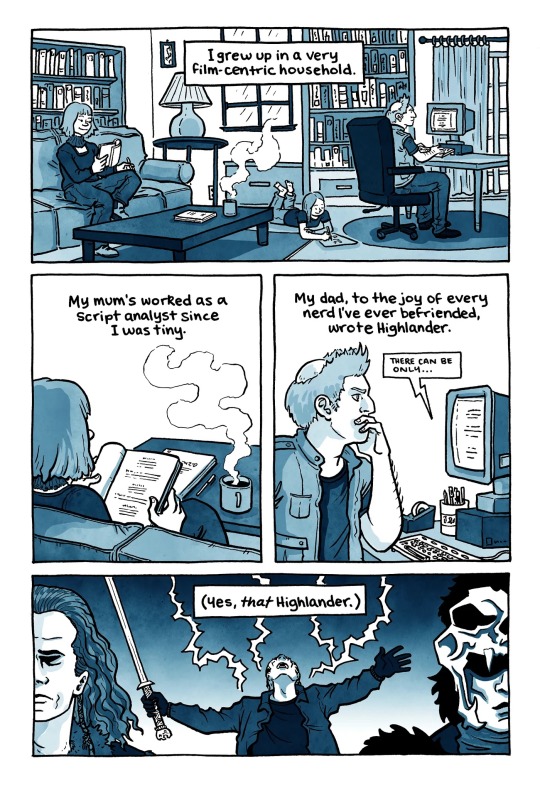
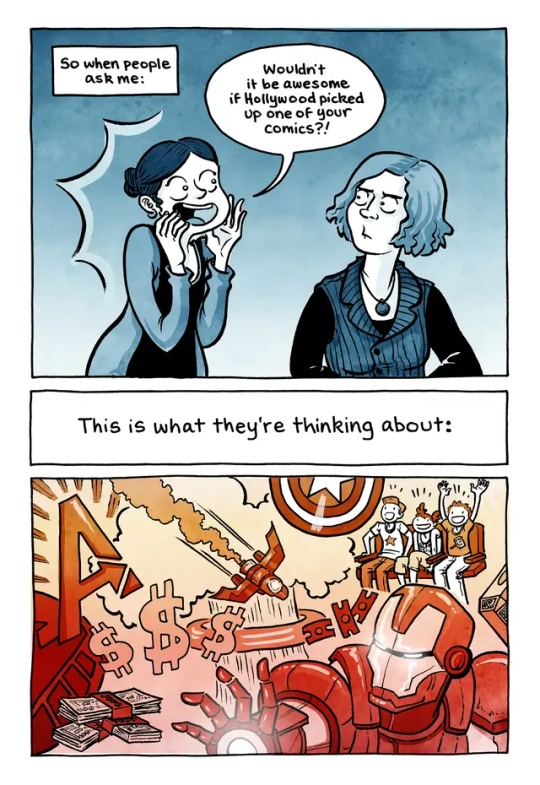

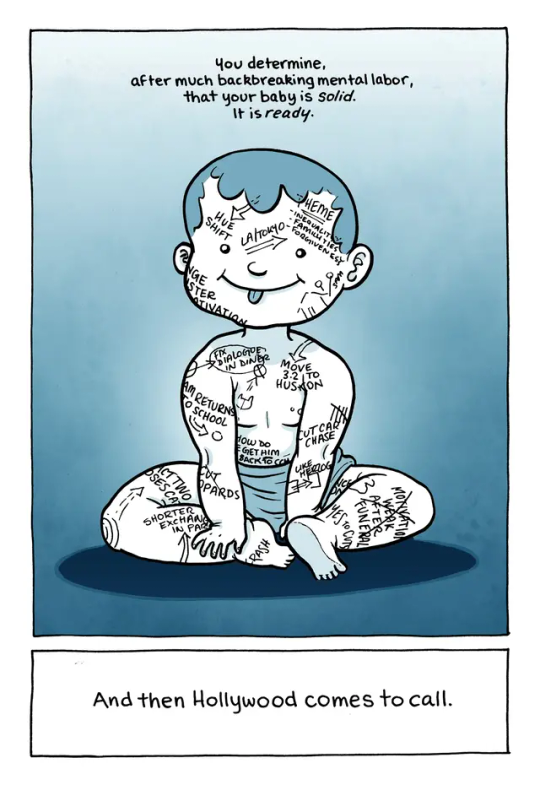
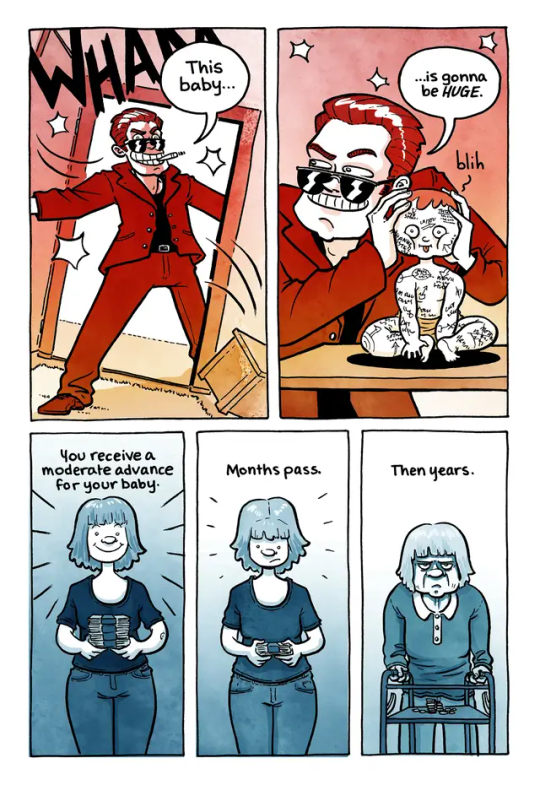
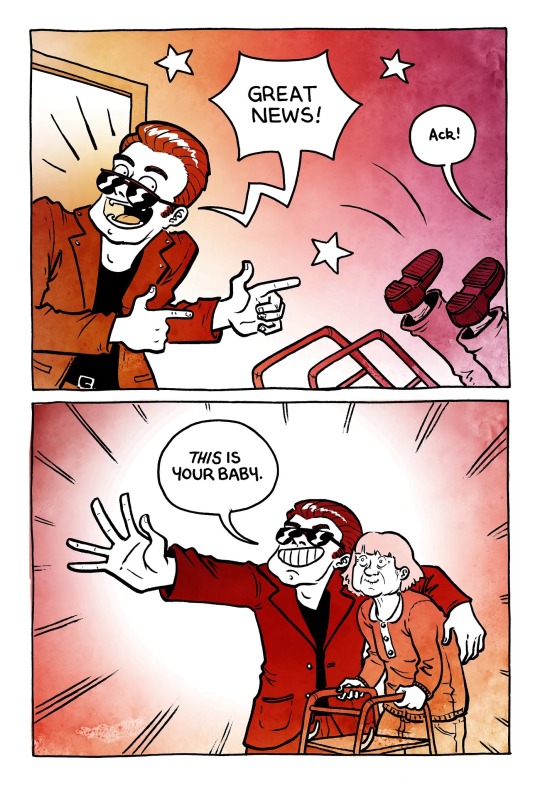

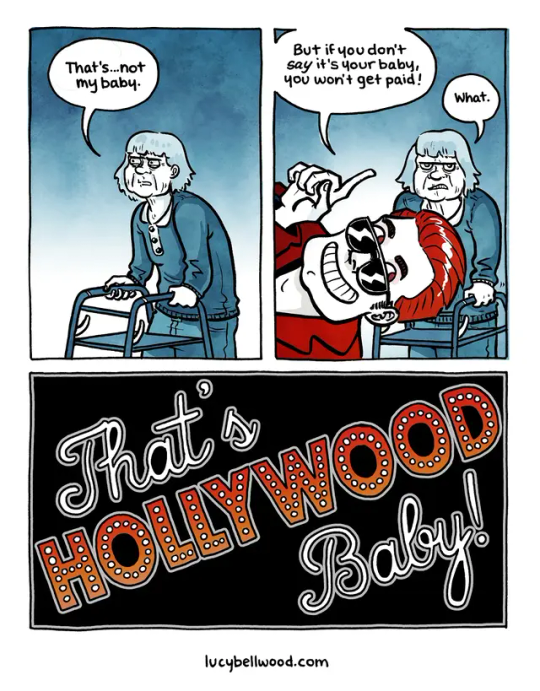
Another piece I did for The Nib back in 2015! Gonna keep posting these until they shut down at the end of the summer. It was such a treat to hear that Matt and the whole editorial team just won an Eisner for their work on the magazine and website. Much-deserved.
Anyway: this is a parody and isn't representative of every screenwriter's experience, but it certainly feels relevant with all the strikes rolling out right now. Did you know what kind of credit you get on a film directly impacts how much you're paid? For writers you'll see "created by," "written by," "story by," and all sorts of other things, all of which translate to different levels of compensation! (Highlander, for example, has Story by Gregory Widen and Screenplay by my dad and his writing partner, Larry Ferguson.) The Writer's Guild is often responsible for arbitrating those decisions. They have a whole MANUAL to help writers understand the process. It rules.
Thanks, WGA. Thanks, The Nib. (And you can always make more of these comics possible on Patreon.)
#hollywood#do the write thing#wga strike#wga strong#film credits#highlander#the nib#comics#personal work#babies#film industry#lucy bellwood
11K notes
·
View notes
Text
there's something deeply gutting about being a writer right now. watching studio execs brag about starving people like you out of your very house just to not pay you anything above the pennies you currently make. watching some people cheer over AO3 being targeted for a DDOS attack. the complete lack of profitability of writing commissions or writing in general in transformative spaces, especially in contrast to fanart. the pivot of so many social media platforms to be video and image based near-exclusively.
I don't know. it just makes me sad to know that the hobby that kept me alive while growing up homeschooled with dial-up internet and local antenna TV... is only ever gonna be a side job with minimal engagement. I know this site is good about supporting libraries and the concept of books but, do me a favor? Reach out to a writer friend you know. Leave a comment on your last five read stories on your favorite website.
Tell us you care.
#maybe that's why I've been so stalled on my novel#I keep trying to convince myself there's a POINT to it#but I look at how BRUTAL the publishing industry is and how I can't even consistently break ten reblogs on writing I post here#and I just. it hurts. and I have other hobbies I could fall back on!!! I could do art and cosplay and cater to the immediate engagement!!#but writing is my LOVE and my PASSION and I just wish. I wish the current climate CARED about us#TALKED to us the way we talk to cosplayers and artists and the chocolate guy#UGH. Wednesday blues hitting me NASTY today
6K notes
·
View notes
Text
you have to go to work so you can pay for your doctor, who is not taking your insurance right now, and if you say i can't afford the doctor's you are told - get a better job. it is very sad that you are unwell, yes, but maybe you should have thought about that before not having a better job.
(where is the better job? who is giving out these better jobs? you are sick, you are hurting - how the hell are you supposed to be well enough for this better job?)
but you go to the doctor because you had the nerve to be hurt or sick or whatever else. and they tell you that it is because you have anxiety. you try your best. you are a self-advocate. you've done the reading (which sometimes pisses them off worse, honestly). you say it is actually adding to my anxiety, it is effecting my quality of life. so they say that you are fat. they say that all young people have this happen to them, isn't it a medical marvel! they say that you should eat more vegetables. they say that you probably just need to lose a little more weight, and that you are faking it for attention.
(what attention could this doctor possibly give? what validation? that's their fucking job, isn't it?)
there is always a hypochondriac, right. someone always tells you about a hypochondriac. or someone who is unnecessarily aggressive during the worst days of their life. or someone looking "for a quick fix". or some idiot who wasn't educated about how to properly care for themselves who just abandons their treatment. and again, the hypochondriac, the overly-cautious hysteric. these people don't deserve to be treated like humans (right), and since you might be one of these people, you also don't get treated like a human. because those people can really fuck with the system, you now have to pay for it. and besides. you're actually probably faking it.
(more often than not, you find a 2:1 ratio of these stories. for every "hypochondriac", there are 2 people who knew something was wrong, and yet nobody could fucking find it. the story often ends with pointless suffering. the story often ends with and now it's too late, and it's going to kill me.)
you are actually just making excuses. someone else got that procedure or that diagnosis and he's fine, you should be fine too. someone else said they watched a documentary about other inspirational people with your exact same condition, maybe you should be inspirational, too. you're just too morbid. your pain and your experience is probably just not statistically concerning. it is all self-reported anyway, and you're just being a baby.
(once, while sitting down in the middle of making coffee, you had the sudden, horrible thought - i could kill myself to make the pain stop. you had to call your best friend after that. had to pet your dog. had to cry about it in the shower. you won't, but that moment - god, fuck. the pain just goes on and on.)
you know someone who went in for routine surgery and said i still feel everything. they told her to just relax. it took her kicking and screaming before they figured out she wasn't lying - the anesthetic drip hadn't been working. you know someone who went in for severe migraines who was told drink water and lose weight. you know someone who was actively bleeding out and throwing up in the ER and was told you're just having a bad period.
in the ER there are always these little posters saying things like "don't wait! get checked today!" and you think about how often you do wait. how often the days spool out. you once waited a full week before seeing the doctor for what you thought was a sprained wrist. it had actually been broken - they had to rebreak it to set it.
but you go into the doctor. the problem you're having is immediate. the person behind the counter frowns and says we're not taking your insurance. you will be paying for this out-of-pocket.
they send you home with tylenol and a little health packet about weight loss or anxiety or attention deficit. on the front it has your birthday and diagnosis. you think about crying, and the words swim. it might as well say go fuck yourself. it might as well say you're a fucking idiot. it might as well say light your money on fire and lie down in it. and the entire fucking time - the problem persists.
it's okay. it's okay, it's just another thing, you think. it's just another thing i have to learn to live with.
#spilled ink#warm up#can you tell what i'm mad about today specifically#i will say that there are a LOT of things that go into this. like a lot. this is ungendered and unspecific for a reason#it isn't just sexism. it's also racism. and ableism. and honestly classism.#and before a healthcare professional reads this as a personal attack: i understand ur burnt out#we are ALSO burnt out. your situation is also dire. this is not an attack on you.#this is a commentary on the incredible amounts of bigotry that lie at the heart of capitalism#where people have to pay money out of pocket to be told to fuck off.#your job is important. so is our humanity. and if you cannot accept that people are fucking mad as hell#at the industry - you are probably not listening .#anyway at some point im gonna write a piece about sexism specifically in medical shit#but i don't want terfs clowning in it bc they can't understand nuance#> it is true that ppl w/a uterus are more likely to experience medical malpractice & dismissal globally#> it is also true that trans people experience an equally fucked up and bad time in the medical field#> great news! the medical industrial complex is an equal opportunity life ruiner :)#(if you find it necessary to go into a debate about biology while discussing medical malpractice#i want to warn you that you're misunderstanding the issue. because guess what.#cis MEN might experience this. particularly black men. particularly disabled men.#so YES having a uterus can lead to more trouble for you. but this happens a LOT.#instead of fighting those ALSO experiencing your pain.... try working WITH them.#which btw. is like. actual feminism.)
2K notes
·
View notes
Text
Publishing has always been a fucking nightmare, but now it’s a layer of hell. It’s not enough that writers be good at what they do. Writers have to maintain an active social media presence and cultivate a following. Be available.
They have to be conventionally attractive enough to look good enough to see on a screen, aesthetically pleasing, kind, funny, up-to-date on trends, socially aware but not so controversial that they turn off a brand from California from slapping their discount code on a video promoting a book.
They have to do all of this with no media training, with little help from the companies that are supposed to be doing this for them.
Of course, a lot of this isn't possible for say, the 40-something mother of two who teaches English at a school and writes on the side. She’s boxed out of an already complex industry that already has enough walls.
On some level, I think authors have always marketed themselves a little, but we’ve reached such a crazy point where we’re demanding the author become the influencer. Accessibility in publishing has narrowed from an inch to a sliver. And that inch was hard enough to get in as is.
#This is about traditional publishing but there’s pretty privilege and ageism in self publishing too#I can’t think of the last time I saw an up and coming author recording videos who was over thirty#And frankly that’s a shame#It could be that I’m not looking hard enough#but it’s more likely that algorithms are trained the way they are#truly I don’t think they should have to do any of that at all#And forgive me but (and I know it’s rich because I’m an artist on a platform) but art shouldn’t be at the mercy of an algorithm#Now there’s also something to be said about self publishing becoming easier and easier to achieve success in#And doors opening because of influencer status is real and makes publishing wider in a way#But that doesn’t mean it’s accessible#I’m not gonna plaster my health issues over the wall but that life is certainly not accessible to me!#are you healthy enough to write and make sure people on social media still want to like your stuff#are you mentally well enough to be your own pr#I’m sure people who have studied this have more to say and have said it better but this is what I’ve observed#writing#publishing#publishing industry
751 notes
·
View notes
Text
The Real Cost of the Fashion Industry
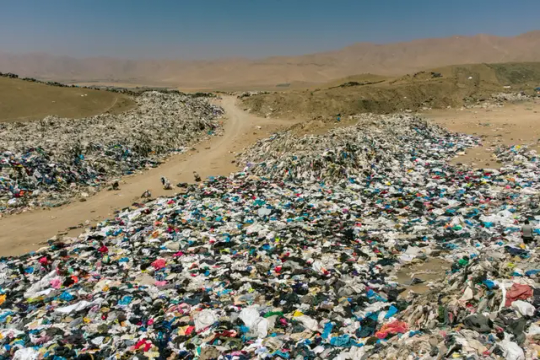
Atacama Desert, in Alto Hospicio, Iquique, Chile. (source)
The textile industry is destroying the world. The industry is wasting massive amounts of energy and materials, and polluting the air, the ground and the water supplies. It overwhelmingly exploits it's labour and extracts wealth from colonized countries, especially in Asia. I assume we all broadly understand this, but I think it's useful to have it all laid out in front of you to see the big picture, the core issues causing this destruction and find ways how to effectively move forward.
The concerning trend behind this ever-increasing devastation are shortening of trend cycles, lowering clothing prices and massive amount of wasted products. Still in year 2000 it was common for fashion brands to have two collections per year, while now e.g. Zara produces 24 collections and H&M produces 12-16 collections per year. Clothing prices have fallen (at leas in EU) 30% from 1996 to 2018 when adjusted to inflation, which has contributed to the 40% increase in clothing consumption per person between 1996 and 2012 (in EU). (source) As the revenue made by the clothing industry keep rising - from 2017 to 2021 they doubled (source) - falling prices can only be achieved with increasing worker exploitation and decreasing quality. I think the 36% degrees times clothing are used in average during the last 15 years (source) is a clear indication on the continuing drop in quality of clothing. Clothing production doubled between 2000 and 2015, while 30% of the clothes produced per year are never sold and are often burned instead (source), presumably to prevent the returns from falling due to oversupply.
These all factors are driving people to overconsume. While people in EU keep buying more clothes, they haven't used up to 50% of the clothes in their wardrobe for over a year (source). This overconsumption is only made much worse by the new type of hyper fast fashion companies like SHEIN and Temu, which are using addictive psychological tactics developed by social media companies (source 1, source 2). They are cranking up all those concerning trends I mentioned above.
Under the cut I will go through the statistics of the most significant effects of the industry on environment and people. I will warn you it will be bleak. This is not just a fast fashion problem, basically the whole industry is engaging in destructive practices leading to this damage. Clothing is one of those things that would be actually relatively easy to make without massive environmental and human cost, so while that makes the current state of the industry even more heinous, it also means there's hope and it's possible to fix things. In the end, I will be giving some suggestions for actions we could be doing right now to unfuck this mess.
Carbon emissions
The textile industry is responsible for roughly 10% of the global CO2 emissions, more than aviation and shipping industry combined. This is due to the massive supply chains and energy intensive production methods of fabrics. Most of it can be contributed to the fashion sector since around 60% of all the textile production is clothing. Polyester, a synthetic fiber made from oil which accounts for more than half of the fibers used in the textile industry, produces double the amount of carbon emissions than cotton, accounting for very large proportions of all the emissions by the industry. (source 1, source 2)
Worker exploitation
Majority of the textiles are produced in Asia. Some of the worst working conditions are in Bangladesh, one of the most important garment producers, and Pakistan. Here's an excerpt from EU Parliament's briefing document from 2014 after the catastrophic Rana Plaza disaster:
The customers of garment producers are most often global brands looking for low prices and tight production timeframes. They also make changes to product design, product volume, and production timeframes, and place last-minute orders without accepting increased costs or adjustments to delivery dates. The stresses of such policies usually fall on factory workers.
The wage exploitation is bleak. According to the 2015 documentary The True Cost less than 2% of all garment factory workers earned a living wage (source). Hourly wages are so low and the daily quotas so high, garment workers are often forced through conditions or threats and demand to work extra hours, which regularly leads to 10-12 hour work days (source) and at worst 16 hour workdays (source), often without days off. Sometimes factories won't compensate for extra hours, breaching regulations (source).
Long working hours, repetitive work, lack of breaks and high pressure leads to increased risks of injuries and accidents. Small and even major injuries are extremely common in the industry. A study in three factories in India found that 70% of the workers suffered from musculosceletal symptoms (source). Another qualitative study of female garment workers and factory doctors in Dhaka found that long hours led to eye strain, headaches, fatigue and weight loss in addition to muscular and back pains. According to the doctors interviewed, weight loss was common because the workers work such long hours without breaks, they didn't have enough time to eat properly. (source) Another study in 8 factories in India found that minor injuries were extremely common and caused by unergonomic work stations, poor organization in the work place and lack of safety gear, guidelines and training (source). Safety precautions too are often overlooked to cut corners, which periodically leads to factory accidents, like in 2023 lack of fire exists and fire extinguishers, and goods stacked beyond capacity led to a factory fire in Pakistan which injured dozens of workers (source) or like in 2022 dangerous factory site led to one dead worker and 9 injured workers (source).
Rana Plaza collapse in 2013 is the worst industrial accident in recent history. The factory building did not have proper permits and the factory owner blatantly ignored signs of danger (other businesses abandoned the building a day before the collapse), which led to deaths of 1 134 workers and injuries to 2 500 workers. The factory had or were at the time working for orders of at least Prada, Versace, Primark, Walmart, Zara, H&M, C&A, Mango, Benetton, the Children's Place, El Corte Inglés, Joe Fresh, Carrefour, Auchan, KiK, Loblaw, Bonmarche and Matalan. None of the brands were held legally accountable for the unsafe working conditions which they profited off of. Only 9 of the brands attended a meeting to agree on compensation for the victim's families. Walmart, Carrefour, Auchan, Mango and KiK refused to sight the agreement, it was only signed by Primark, Loblaw, Bonmarche and El Corte Ingles. The compension these companies provided was laughable though. Primemark demanded DNA evidence that they are relatives of one of the victims from these struggling families who had lost their often sole breadwinner for a meager sum of 200 USD (which doesn't even count for two months of living wage in Bangladesh (source)). This obviously proved to be extremely difficult for most families even though US government agreed to donate DNA kits. This is often said to be a turning point in working conditions in the industry, at least in Bangladesh, but while there's more oversight now, as we have seen, there's clearly still massive issues. (source 1, source 2)
One last major concern of working conditions in the industry I will mention is the Xinjiang raw cotton production, which is likely produced mainly with forced labour from Uighur concentration camps, aka slave labour of a suspected genocide. 90% of China's raw cotton production comes from Xinjiang (source). China is the second largest cotton producer in the world, after India, accounting 20% of the yearly global cotton production (source).
Pollution
Synthetic dyes, which synthetic fibers require, are the main cause of water pollution caused by the textile industry, which is estimated to account for 20% of global clean water pollution (source). This water pollution by the textile industry is suspected of causing a lot of health issues like digestive issues in the short term, and allergies, dermatitis, skin inflammation, tumors and human mutations in the long term. Toxins also effect fish and aquatic bacteria. Azo dyes, one of the major pollutants, can cause detrimental effects to aquatic ecosystems by decreasing photosynthetic activity of algae. Synthetic dyes and heavy metals also cause large amounts of soil pollution. Large amounts of heavy metals in soil, which occurs around factories that don't take proper environmental procautions, can cause anaemia, kidney failure, and cortical edoem in humans. That also causes changes in soil texture, decrease in soil microbial diversity and plant health, and changes in genetic structure of organisms growing in the soil. Textile factory waste water has been used for irrigation in Turkey, where other sources of water have been lacking, causing significant damage to the soil. (source)
Rayon produced through viscose process causes significant carbon disulphide and hydrogen sulphide pollution to the environment. CS2 causes cardiovascular, psychiatric, neuropsychological, endocrinal and reproductive disorders. Abortion rates among workers and their partners exposed to CS2 are reported to be significantly higher than in control groups. Many times higher amounts of sick days are reported for workers in spinning rooms of viscose fiber factories. China and India are largest producers of CS2 pollution, accounting respectively 65.74% and 11,11% of the global pollution, since they are also the major viscose producers. Emission of CS2 has increased significantly in India from 26.8 Gg in 2001 to 78.32 Gg in 2020. (source)
Waste
The textile industry is estimated to produce around 92 million tons of textile waste per year. As said before around 30% of the production is never sold and with shortening lifespans used the amount of used clothing that goes to waster is only increasing. This waste is large burned or thrown into landfills in poor countries. (source) H&M was accused in 2017 by investigative journalists of burning up to 12 tonnes of clothes per year themselves, including usable clothing, which they denied claiming they donated clothing they couldn't sell to charity instead (source). Most of the clothing donated to charity though is burned or dumbed to landfills (source).
Most of the waste clothing from rich countries like European countries, US, Australia and Canada are shipped to Chile (source) or African countries, mostly Ghana, but also Burkina Faso and Côte d'Ivoire (source). There's major second-hand fashion industries in these places, but most of the charity clothing is dumbed to landfills, because they are in such bad condition or the quality is too poor. Burning and filling landfills with synthetic fabrics with synthetic dyes causes major air, water and soil pollution. The second-hand clothing industry also suppresses any local clothing production as donated clothing is inherently more competitive than anything else, making these places economically reliant on dumbed clothing, which is destroying their environment and health, and prevents them from creating a more sustainable economy that would befit them more locally. This is not an accident, but required part of the clothing industry. Overproduction let's these companies tap on every new trend quickly, while not letting clothing the prices in rich countries drop so low it would hurt their profits. Production is cheaper than missing a trend.
Micro- and nanoplastics
There is massive amounts of micro- and nanoplastics in all of our environment. It's in our food, drinking water, even sea salt (source). Washing synthetic textiles accounts for roughly 35% of all microplastics released to the environment. It's estimated that it has caused 14 million tonnes of microplastics to accumulate into the bottom of the ocean. (source)
Microplastics build up into the intestines of animals (including humans), and have shown to probably cause cause DNA damage and altered organism behavior in aquatic fauna. Microplastics also contain a lot of the usual pollutants from textile industry like synthetic dyes and heavy metals, which absorb in higher quantities to tissues of animals through microplastics in the intestines. Studies have shown that the adverse effect are higher the longer the microplastics stay in the organism. The effects cause major risks to aquatic biodiversity. (source) The health effects of microplastics to humans are not well known, but studies have shown that they could have adverse effects on digestive, respiratory, endocrine, reproductive and immune systems. (source)
Microplastics degrade in the environment even further to nanoplastics. Nanoplastic being even smaller are found to enter blood circulation, get inside cells and cross the blood-brain barrier. In fishes they have been found to cause neurological damage. Nanoplastics are also in the air, and humans frequently breath them in. Study in office buildings found higher concentration of nanoplastics in indoor air than outdoor air. Inside the nanoplastics are likely caused mostly by synthetic household textiles, and outdoors mostly by car tires. (source) An association between nanoplastics and mitochondrial damage in human respiratory cells was found in a recent study. (source)
Micro and nano plastics are also extremely hard to remove from the environment, making it even more important that we reduce the amount of microplastics we produce as fast as possible.
What can we do?
This is a question that deserves it's own essays and articles written about it, but I will leave you with some action points. Reading about these very bleak realities can easily lead to overwhelming apathy, but we need to channel these horrors into actions. Whatever you do, do not fall into apathy. We don't have the luxury for that, we need to act. These are industry wide problems, that simply cannot be fixed by consumerism. Do not trust any clothing companies, even those who market themselves as ethical and responsible, always assume they are lying. Most of them are, even the so called "good ones". We need legislation. We cannot allow the industry to regulate itself, they will always take the easy way out and lie to their graves. I will for sure write more in dept about what we can do, but for now here's some actions to take, both political and individual ones.
Political actions
Let's start with political actions, since they will be the much more important ones. While we are trying to dismantle capitalism and neocolonialism (the roots of these issues), here's some things that we could do right now. These will be policies that we should be doing everywhere in the world, but especially rich countries, where most of the clothing consumption is taking place. Vote, speak to others, write to your representative, write opinion pieces to your local papers, engage with democracy.
Higher requirements of transparency. Right now product transparency in clothing is laughably low. In EU only the material make up and the origin country of the final product are required to be disclosed. Everything else is up to the company. Mandatory transparency is the only way we can force any positive changes in the production. The minimum of transparency should be: origin countries of the fibers and textiles in the product itself; mandatory reports of the lifecycle emissions; mandatory reports of whole chain of production. Right now the clothing companies make their chain of production intentionally complex, so they have plausible deniability when inevitably they are caught violating environmental or worker protection laws (source). They intentionally don't want to be able to track down their production chain. Forcing them to do so anyway would make it very expensive for them to keep up this unnecessarily complex production chain. These laws are most effective when put in place in large economies like EU or US.
Restrictions on the use of synthetic fibers. Honestly I think they should be banned entirely, since the amount of microplastics in our environment is already extremely distressing and the other environmental effects of synthetic fibers are also massive, but I know there are functions for which they are not easily replaced (though I think they can be replaces in those too, but that's a subject of another post), so we should start with restrictions. I'm not sure how they should be specifically made, I'm not a law expert, but they shouldn't be used in everyday textiles, where there are very easy and obvious other options.
Banning viscose. There are much better options for viscose method that don't cause massive health issues and environmental destruction where ever it's made, like Lyocell. There is absolutely no reason why viscose should be allowed to be sold anywhere.
Governmental support for local production by local businesses. Most of the issues could be much more easily solved and monitored if most clothing were not produced by massive global conglomerations, but rather by local businesses that produce locally. All clothing are made by hand, so centralizing production doesn't even give it advantage in effectiveness (only more profits for the few). Producing locally would make it much more easier to enforce regulations and it would reduce production chains, making production more effective, leaving more profits into the hands of the workers and reducing emissions from transportation. When the production is done by local businesses, the profits would stay in the producing country and they could be taxed and utilized to help the local communities. This would be helpful to do in both exploited and exploiter countries. When done in rich countries who exploit poorer ones, it would reduce the demand for exploitation. In poor countries this is not as easily done, since poor means they don't have money to give around, but maybe this could be a good cause to put some reparations from colonizers and global corporations, which they should pay.
Preventing strategic accounting between subsidiaries and parent companies. Corporate law is obviously not my area of expertise, but I know that allowing corporations to move around the accounting of profits and losses between subsidiaries and parent companies in roughly 1980s, was a major factor in creating this modern global capitalist system, where corporations can very easily manipulate their accounting to utilize tax heavens and avoid taxes where they actually operate, which is how they are upholding this terrible system and extracting the profits from the production countries. How specifically this would be done I can't tell because again I know shit about corporate law, so experts of that field should plan the specifics. Overall this would help deal with a lot of other problems than just the fashion industry. Again for it to be effective a large economic area like EU or US should do this.
Holding companies accountable for their whole chain of production. These companies should be dragged to court and made to answer for the crimes they are profiting of off. We should put fear back into them. This is possible. Victims of child slavery are already doing this for chocolate companies. If it's already not how law works everywhere, the laws should be changed so that the companies are responsible even if they didn't know, because it's their responsibility to find out and make sure they know. They should have been held accountable for the Rana Plaza disaster. Maybe they still could be. Sue the mother fuckers. They should be afraid of us.
Individual actions
I will stress that the previous section is much more important and that there's no need to feel guilty for individual actions. This is not the fault of the average consumer. Still we do need to change our relationship to fashion and consumption. While it's not our fault, one of the ways this system is perpetuated, is by the consumerist propaganda by fashion industry. And it is easier to change our own habits than to change the industry, even if our own habits have little impact. So these are quite easy things we all could do as we are trying to do bigger change to gain some sense of control and keep us from falling to apathy.
Consume less. Better consumption will not save us, since consumption itself is the problem. We consume too much clothing. Don't make impulse purchases. Consider carefully weather you actually need something or if you really really want it. Even only buying second-hand still fuels the industry, so while it's better than buying new, it's still better to not buy.
Take proper care of your clothing. Learn how to properly wash your clothing. There's a lot of internet resources for that. Never wash your wool textiles in washing machine, even if the textile's official instructions allow it. Instead air them regularly, rinse them in cool water if they still smell after airing and wash stains with water or small amount of (wool) detergent. Never use fabric softener! It damages the fabrics, prevents them from properly getting clean and is environmentally damaging. Instead use laundry vinegar for making textiles softer or removing bad smells. (You can easily make laundry vinegar yourself too from white vinegar and water (and essential oils, if you want to add a scent to it) which is much cheaper.) Learn how to take care of your leather products. Most leather can be kept in very good condition for a very long time by occasional waxing with beeswax.
Use the services of dressmakers and shoemakers. Take your broken clothing or clothing which doesn't fit anymore to your local dressmaker and ask them if they can do something about it. Take your broken and worn leather products to your local shoemaker too. Usually it doesn't cost much to get something fixed or refitted and these expert usually have ways to fix things you couldn't even think of. So even if the situation with your clothing or accessory seems desperate, still show it to the dressmaker or shoemaker.
If it's extremely cheap, don't buy it. Remember that every clothing is handmade. Only a small fraction of the cost of the clothing will be paying the wages of the person who made it with their hands. If a shirt costs 5 euros (c. 5,39 USD), it's sewer was only payed mere cents for sewing it. I'm not a quick sewer and it takes me roughly 1-2 hours to cut, prepare and sew a simple shirt, so I'm guessing it would take around half an hour to do all that for a factory worker on a crunch, at the very least 15 minutes. So the hourly pay would still be ridiculously low. However, as I said before, the fact that the workers in clothing factories get criminally low pay is not the fault of the consumer, so if you need a clothing item, and you don't have money to buy anything else than something very cheep, don't feel guilty. And anyway expensive clothing in no way necessarily means reasonable pay or ethical working conditions, cheep clothing just guarantee them.
Learn to recognize higher quality. In addition to exploitation, low price also means low quality, but again high price doesn't guarantee high quality. High quality allows you to buy less, so even if it's not as cheep as low quality, if you can afford it, when you need it, it will be cheaper in long run, and allows you to consume less. Check the materials. Natural fibers are your friends. Do not buy plastic, if it's possible to avoid. Avoid household textiles from synthetic fibers. Avoid textiles with small amounts of spandex to give it stretch, it will shorten the lifespan of the clothing significantly as the spandex quickly wears down and the clothing looses it's shape. Also avoid clothing with rubber bands. They also loose their elasticity very quickly. In some types of clothing (sport wear, underwear) these are basically impossible to avoid, but in many other cases it's entirely possible.
Buy from artisans and local producers, if you can. As said better consumption won't fix this, but supporting artisans and your local producers could help keep them afloat, which in small ways helps create an alternative to the exploitative global corporations. With artisans especially you know the money goes to the one who did the labour and buying locally means less middlemen to take their cut. More generally buy rather from businesses that are located to the same country where the production is, even if it's not local to you. A local business doesn't necessarily produce locally.
Develop your own taste. If you care about fashion and style, it's easy to fall victim to the fashion industry's marketing and trend cycles. That's why I think it's important to develop your personal sense of style and preferences. Pay attention at what type of clothes are comfortable to you. Go through your wardrobe and track for a while which clothing you use most and which least. Understanding your own preferences helps you avoid impulse buying.
Consider learning basics of sewing. Not everyone has the time or interest for this, but if you in anyway might have a bit of both, I suggest learning some very simple and basic mending and reattaching a button.
Further reading on this blog: How to see through the greenwashing propaganda of the fashion industry - Case study 1: Shein
Bibliography
Academic sources
An overview of the contribution of the textiles sector to climate change, 2022, L. F. Walter et al., Frontiers in Environmental Science
How common are aches and pains among garment factory workers? A work-related musculoskeletal disorder assessment study in three factories of south 24 Parganas district, West Bengal, 2021, Arkaprovo Pal et al., J Family Med Prim Care
Sewing shirts with injured fingers and tears: exploring the experience of female garment workers health problems in Bangladesh, 2019, Akhter, S., Rutherford, S. & Chu, C., BMC Int Health Hum Rights
Occupation Related Accidents in Selected Garment Industries in Bangalore City, 2006, Calvin, Sam & Joseph, Bobby, Indian Journal of Community Medicine
A Review on Textile and Clothing Industry Impacts on The Environment, 2022, Nur Farzanah Binti Norarmi et al., International Journal of Academic Research in Business and Social Sciences
Carbon disulphide and hydrogen sulphide emissions from viscose fibre manufacturing industry: A case study in India, 2022, Deepanjan Majumdar et al., Atmospheric Environment: X
Microplastics Pollution: A Brief Review of Its Source and Abundance in Different Aquatic Ecosystems, 2023, Asifa Ashrafy et al., Journal of Hazardous Materials Advances
Health Effects of Microplastic Exposures: Current Issues and Perspectives in South Korea, 2023, Yongjin Lee et al., Yonsei Medical Journal
Nanoplastics and Human Health: Hazard Identification and Biointerface, 2022, Hanpeng Lai, Xing Liu, and Man Qu, Nanomaterials
Other sources
The impact of textile production and waste on the environment (infographics), 2020, EU
Chile’s desert dumping ground for fast fashion leftovers, 2021, AlJazeera
Fashion - Worldwide, 2022 (updated 2024), Statista
Fashion Industry Waste Statistics & Facts 2023, James Evans, Sustainable Ninja (magazine)
Everything You Need to Know About Waste in the Fashion Industry, 2024, Solene Rauturier, Good on You (magazine)
Textiles and the environment, 2022, Nikolina Šajn, European Parliamentary Research Service
Help! I'm addicted to secondhand shopping apps, 2023, Alice Crossley, Cosmopolitan
Addictive, absurdly cheap and controversial: the rise of China’s Temu app, 2023, Helen Davidson, Guardian
Workers' conditions in the textile and clothing sector: just an Asian affair? - Issues at stake after the Rana Plaza tragedy, 2014, Enrico D'Ambrogio, European Parliamentary Research Service
State of The Industry: Lowest Wages to Living Wages, The Lowest Wage Challenge (Industry affiliated campaign)
Fast Fashion Getting Faster: A Look at the Unethical Labor Practices Sustaining a Growing Industry, 2021, Emma Ross, International Law and Policy Brief (George Washington University Law School)
Dozens injured in Pakistan garment factory collapse and fire, 2023, Hannah Abdulla, Just Style (news media)
India: Multiple factory accidents raise concerns over health & safety in the garment industry, campaigners call for freedom of association in factories to ‘stave off’ accidents, 2022, Jasmin Malik Chua, Business & Human Rights Resource Center
Minimum Wage Level for Garment Workers in the World, 2020, Sheng Lu, FASH455 Global Apparel & Textile Trade and Sourcing (University of Delaware)
Rana Plaza collapse, Wikipedia
Buyers’ compensation for Rana Plaza victims far from reality, 2013, Ibrahim Hossain Ovi, Dhaka Tribune (news media)
World cotton production statistics, updated 2024, The World Counts
Dead white man’s clothes, 2021, Linton Besser, ABC News
#fashion#fashion industry#sustainability#sustainable fashion#sustainable clothing#environment#climate change#i will be continuing the series of how to see through fashion industry propaganda at some point#i just felt compelled to write this because i feel like people so often miss the forest for the trees in this conversation
451 notes
·
View notes
Text
Big big fan of SI employees being intimidated by Tony at first because wtf iron man is my boss but then a couple months into the job they see Tony in the same room as Steve and realize he's just a science nerd with a big dorky crush on Captain America there's nothing to fear he's just like us fr
#youre in love with captain america??#mr stark#get in line#stony#stevetony#tony stark#steve rogers#captain america#iron man#superhusbands#ao3#fanfic#ironshield#i might write a fic lowkey#and yes si employees includes peter#stark industries
598 notes
·
View notes
Text
I still can't get the unused concept art of Wish out of my head so I've been reading a lot of rewrites and looking at a lot of Wish redesigns...
So... I got inspired. I'm currently conceptualizing my own Wish "rewrite/redesigns", but with a twist. It's gonna be a spiritual "prequel", cuz idk I feel like being meta since we'll be using the original concepts before the final concepts/decisions made for the final movie XD
Many of my "prequel" characters will be stand-ins for the canon characters! So "Asha" will be renamed "Amala", "Magnifico" will be called "Mamoun", and so on. Think of Pokemon Legends: Arceus regarding the relations of these "OCs" with the canon characters.
Anyway, here are the designs I have so far! I only have the designs for Amala and the Star for now. Hopefully, I can get to draw the other characters soon, especially Mamoun and his wife.
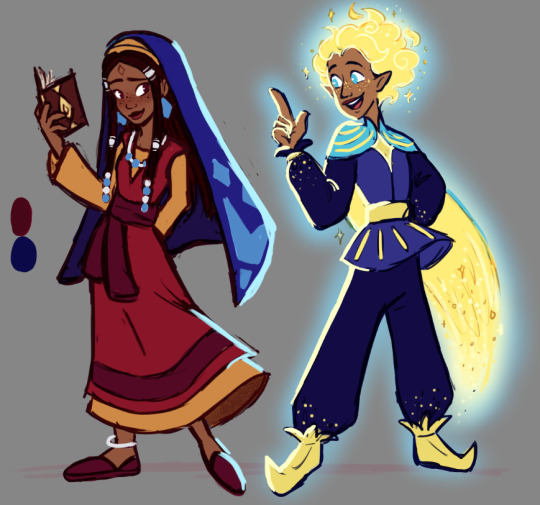
The story will be called "Once Upon a Wish"
Here's an overview of what I have so far... Some details may change if I feel like my other choices serve the story better. (Also, small disclaimer, this is just a veryyy self-indulgent AU made by yours truly, so some details may not be accurate with the canon lore present in Wish)
The story takes place on the same island of Rosas, but from many years ago. If my research is right, canon Wish takes place in the 1200s, so maybe my "prequel" can take place in around the 900s-1000s. Rosas definitely wasn't called Rosas back then, but I'm still figuring out what to call it so I'm just gonna refer to it as "an island".
Amala is a shy, meek, but hardworking apprentice of the island's head sorcerer Mamoun (hence, her color palette looks similar to Mickey's outfit from The Sorcerer's Apprentice). Despite all her hard work in her magic studies, she doesn't really excel at using magic, making a lot of accidents during training. If there's anything she really excels at, it's the act of storytelling (She can draw/animate, sing, and write stories like fairy tales).
Amala also has a little sister Ayah, who I can imagine is the Lilo/Anna to Amala's Nani/Elsa. Ayah is spunky and cheerful, but she has an illness that makes her disabled. The sisters are orphans, but they live under an old family friend they affectionately call Grandpa Dabir. Dabir is a retired bard turned doctor who was part of a troupe with 6 other former bards, all of whom he and the sisters still interact.
That's all I can share for now. Feel free to ask me any questions about stuff about this AU!
#ryl rambles#rylxdraws#wish#disney wish#wish 2023#wish concept art#starboy#asha#wish redesign#wish rewrite#wish au#once upon a wish#idk if I ever do make a fic of this#ill probably try to make it in screenplay format#i just wanna try if i wanna go into the animation industry#if im motivated enough to write it of course HAHAHA
197 notes
·
View notes
Text
always a fun time when real life people are doomed by their own narratives. like guys you know it doesn’t have to be like this right? this isn’t a stageplay the foreshadowing isn’t real until you make it real
#what do roman senators rock stars and real pirates have in common#i would love to write a magical realism psychological horror movie about a up-and-coming celebrity#in which the premise is that the more and more you garner a parasocial following#(i.e.#the more and more you are treated like a character instead of a real person)#the more you become subject to the rules of fiction and thus narrative fate#and the protagonist slowly but surely realizes that by becoming famous they’ve sold away their own ontology#//#this happened to my buddy roger waters#god. i need to find that sexy quote from pete townshend about how the music industry is perpetuated on human sacrifice
318 notes
·
View notes
Text
Script Analysis ~ Readers Class on 6/17 - This Saturday!
Reading and analyzing scripts is one of the best ways to improve your writing! It’s so much easier to see glaring problems and brilliant writing in work that is not your own – and once you see it and know what to look for, you can apply it to your scripts.


For more info.
#scriptwriting#scriptwriter#writing#write#script chat#amwriting#script analysis#script#writers support#scriptwriting classes#scriptwriting workshop#writing community#writing course#writers block#writers programs#good writing#writing industry#screenwriting industry#scriptwriters network#screenwriters network
1 note
·
View note
Text
i’ve stared at this for so long that i now hate it and think ive lost all concept of how to write so take this and get it out of my google docs
the introduction is rough and the medical depictions (and accuracy/realism) could use some (a lot of) work but whatever! here it is, my vague yet still oddly specific idea of how the face reveal would go in @myriadblvck ’s streamer au:
tw: description of a panic attack? i think?
[this takes place post first irl meet but before they’re officially together]
imagine ghost has a glasgow smile but on one side they carved a little too deep and left some nerve damage. time and surgery helped, after which he could eat unimpeded and talk without a lisp, but there's still some facial nerve damage and/or skin contractures from scarring, specifically around the corner of his mouth.
now, everytime he smiles, be it shit eating grin or a full genuine joy filled smile that not even grumpy mcgrumperson could hold off, it always looks wrong because one corner doesn't raise fully like the other.
everything else is fine, there isn’t any facial paralysis, he just smiles… wrong. especially since only one eye properly squints when he smiles, giving him the look of someone who got stuck mid wink.
if he wants to look “normal” (or as normal as he could get it) he has to manually squint his other eye. still, it always felt weird; you don't realize how much those muscles affect the rest of your face until they're gone.
it's why he learned to always wear the mask.
when his expression is neutral, you don’t really notice it. if you can see his mouth when he talks however, it’s obvious that there’s something wrong. he wouldn’t say he’s necessarily ashamed of the scars and damage itself, but it’s the stares that are the worst. before he started hiding behind it, people would openly gawk or even glare at him as if he was some ne’er-do-well gang member that got what was coming to him.
he still remembers the cosmetic surgeon that had been talking to him about fixing the contractures— the whole appointment was a fucking nightmare. the cuts had healed nicely enough especially considering how bad it could have been; he was lucky to only need a little cosmetic help. the only reason he was there was so he could fucking eat food without struggling to open his mouth.
the doctor spent god knows how long breaking down everything wrong with his face like he was a fucking car mechanic lying about how dirty your filter is. the guy constantly mentioned that while he was under, they could also fix his jawline, do a rhinoplasty, trying to break him down to agree to more work.
he was already fuming my the time the doc brought up how kids would react. asking ghost if he wanted to scare children since “you cant expect the little youngins that are still learning about the world to not get scared by something scary,” and that “even some adults would cringe at the scarring.”
what stuck out most was the condescending smile he had when he said it. as if he was pointing out the obvious and ghost was being stupid and shortsighted by not agreeing.
he declined everything except what was medically necessary. the procedure went fine and after an aggravatingly long recovery period, he could eat solid foods again without issue. but the comments still stuck with him.
…okay, maybe he’s a little ashamed.
scaring kids with your face doesn’t feel good and being reminded of everything you’ve lost when you try to smile can really fuck you up in a way words fail to describe.
so yeah, he hates it. he’s gotten used to the mask, both skull clad balaclava and simple medical mask, being a permanent layer of armor. even now that he’s a bit more comfortable in his own skin it still feels wrong to pull it off.
when he gets close to soap, it still feels like a layer of vulnerability that he’ll never be prepared for.
the first time he let soap see his face, there hadn’t been any grandiose build up, no extravagant planning.
simon had arrived just a few hours earlier. he hated commercial flights with a burning passion but it was always worth it to see johnny.
with soaps twin out of town for the week, he had decided to take leave to spend time with his friend, a friend that he most certainly did NOT have a crush on (a disclaimer roach and gaz heard everytime they started snickering over ghost taking leave.)
johnny had cooked something nice and simple for dinner, saying that simon had spent too long with MREs and deserved real food (ghost only agreed if he was the one washing the dishes, soap had laughed and told him he's not so kind as to let him off the hook for chores).
when they ate, it was always in the living room with johnny taking care to always stay angled away from simon, never trying to catch a glimpse, regardless of how much he wanted to see what was under the mask. the obvious gesture of kindness and respect for his boundaries always left him feeling all weird and fuzzy inside. but, then again, johnny seemed pretty good at triggering that feeling in general.
their finished plates were on the coffee table and johnny was watching whatever dumb movie he had put on. he was pretty sure the man spent more time talking over it and making fun of everything than he did actually watching it (it was simon’s favorite way to watch a movie.)
ghost however, was watching soap. thinking.
in the end, it was an impulsive decision made after a strong three seconds of consideration.
“you uhm— you can look by the way,” ghost stared at the can of soda in his hands, immediately regretting the words.
“what?” soap didn’t fully turn, just shifted slightly to hear him better. a simple gesture to show he was listening without turning to face him. it normally made simon happy to see that johnny was more than willing to accommodate for his boundaries. now though it made him feel stupid for robbing johnny of a normal face to face conversation, a normal human interaction, just over his idiotic insecurities.
“my face, you—,” he felt his heart block his airway and tried clearing his throat before continuing, “you can look if you want,” christ he wanted the ground to swallow him whole. why was he getting so fucked up over this?
“are you sure?” he hadn’t turned yet, but ghost could see his pensive expression from here. this should be nothing. realistically, he knew johnny seeing his scars wouldn’t suddenly make him hate him… right?
“yes.”
but it was more than the fear of hatred, wasn’t it? he was scared that johnny would see him. see more than just the scars, see all of the ugly idiosyncrasies and insecurities laid bare. afraid that johnny would see the truth of how unlovable he was.
jesus he was getting so fucking worked up and dramatic over nothing.
ghost didn’t look up. he made an effort to not focus on his peripheral vision. he heard soap turn, heard the intake of breath. the silence was loud only for a second. then, deafening white noise surrounded him, inescapable, suffocating.
fuck.
he didn’t regret giving permission but god did he regret everything else; the stupid scars, the stupid nerve damage, the stupid way he had managed to fall for someone so fucking good like johnny while he was unequivocally unworthy of his love.
stop being so fucking dramatic. you are not together, never have been and never will be. reality was blatant in front of him but it didn’t stop his heart from foolishly hoping.
he heard soap stand and walk closer. saw from where he was still staring a hole in the can his feet step in front of his. saw johnny’s hands raise. he took a deep breath in, closed his eyes, and with a great deal of effort didn’t flinch when soaps fingers grazed his cheek.
both of his hands came up to cup his face, holding him and ever so slightly tilting his face up, giving him the chance to pull away. he didn’t. he may be a coward but he wasn’t backing down.
ghost eventually opened his eyes to see soap staring at him with wide eyes. he looked away, staring off to some point on the right. he hated not knowing what soap was thinking.
they stayed there for a while before soap broke the silence, muttering, “i fuckin knew you had freckles.”
it was stupid but it shocked a laugh out of ghost. he meant to drop his head, embarrassed that something so dumb made him laugh, but accidentally just pushed himself further into soaps hands making him blush.
he looked up and saw soap staring even harder than before. the chuckle died in his chest.
“do that again.”
ghost just gave him a confused look.
“smile.”
such a simple request, a one word sentence, but it set his face ablaze. his breath caught in his throat, somewhere around where his heart was still trying to choke him.
…he hadn’t thought it was that bad but soaps reaction indicated otherwise. fuck. was his it that awful? he wanted the ground to swallow him whole. this was stupid. he was stupid.
“simon,” of course, one word from johnny and it felt like he could breathe again.
“please?”
fucking goddamn soap and his stupid fucking puppy dog eyes and the way he has ghost wrapped around his fucking finger without even realizing.
ghost smiled. there was no real mirth, more a grimace than anything else. he just wanted to get this over with.
soap was still staring at him, his thumbs tracing his lips, following scars, drawing imaginary lines between freckles… if he wasn't so terrified it might have felt nice.
“Christ,” ghosts heart cracked more, “you weren't lying when you said you were beautiful.”
ghost huffed a laugh and went back to staring off to the right, the fake smile dropping. of course soap would try to lighten the mood with a joke.
his panic fled as quickly as it had consumed him, now just left sitting in soap's living room, face still cradled in caring hands, resigned to his mistakes.
he felt so tired and johnny's hands felt so inviting.
“i wasn't joking,” soap looked…upset? angry? wait— fuck, what’d he do?
ghost stared back at soap, confused and tired. soaps nails felt the grooves of the scar, catching where the skin was raised and lowered.
“you don't have to lie, soap. im a grown man. I'm not fragile. you don't need to coddle me,” ghost said it like it was a joke, hoping soap would laugh along and that this would all just blow over. that tomorrow morning they could forget this ever happened.
“are you calling me a liar?” soap’s brow furrowed. great. instead, he had managed to make everything worse and piss off soap as well.
ghost took in a deep breath, giving himself another shot at calming things down, “no, I'm not. I think you're lying, but you're not a liar,” he stood and stepped to the side, grabbing their dirty plates and walking them to the kitchen sink, “you just don't want to upset me, it's fine. I get it. you're a nice person but you don't have to lie to spare my feelings.”
“I am not fucking lying!” as per usual, all ghost had managed to do was make things worse. there’s a reason he had decided to stick to the battlefield and give up on domesticity.
“well alright then. agree to disagree,” he turned the kitchen tap and started rinsing the dishes, waiting for the water to heat up. just walk away. end it there. let us forget about this stupid blunder and move on. please just leave it. please, please, please—
“no.”
the force behind it damn near made ghost drop the plate he was holding. he managed to set it in the sink carefully and turned to face soap, who was now in the kitchen as well.
“i— I'm not just gonna fucking— simon,” soap took in a deeper breath and went to continue but ghost was faster.
“johnny,” he interrupted, walking forward with his hands up in a gesture of surrender, approaching slowly.
one last chance to not fuck everything up.
“the fact is they're called deformities for a reason. they're not cute. they're not pretty. they're your body’s way of healing what it can and protecting what it can't. it's not meant to look nice, it's just—”
“bullshit they’re not pretty! says fucking who?” the genuine distress in soap’s voice and force behind his words caught him off guard. “simon—”
he huffed and ran his fingers through his hair roughly, pulling slightly at the strands. christ, ghost needs to shut the fuck up. every single time he speaks he just upsets soap more and more.
he needs to retake his hostage negotiations courses. clearly he has forgotten everything about how to diffuse a situation.
johnny takes another second to breathe and collect his thoughts before he speaks.
“simon. I know that— that ‘this’ isn't something that's going to fix itself overnight and I don't expect it to. but, ‘the fact is,’ I think you're pretty.”
ghost opens his mouth to disagree but johnny doesn’t let him.
“no no,” johnny put his hand over simon’s mouth, shocking him into silence. he blinks twice, stupefied.
“i think— no. I know you're pretty. cute even. beautiful is a given but obviously worth mentioning.”
his hand moved to cup simon’s cheek. ghost grabbed his wrist but didn’t stop him, wether it was a warning or encouragement he himself didn’t know.
johnny continued, unperturbed, “you disagreeing doesn't change that, right?”
there was a pause and simon realized he wanted an answer.
“johnny-”
“ah ah!” his hand moved back to cover his mouth, grabbing his face and shaking his head back and forth, over accentuating his words, “you disagreeing doesn't change that, right? yes or no.”
he stopped shaking him and moved his hand back to simon’s cheek. simon sighed, defeated, “yes. you are right.”
johnny looked smug, “good. and what do you say when i give you a compliment you don’t agree with?”
simon sputtered, “wha— i don't fucking know—”
“nothing! you don’t say anything!” soap looked way too proud of himself and he continued, “or thank you if you feel so inclined.”
“that was a trick question,” simon replied eventually.
johnny thumbed over his scars once more, again tracing them, “sure it was. now go take a shower.”
he patted his cheek twice and walked to the hallway.
“wait,” johnny probably shook the few remaining brain cells out of his head. “this whole conversation ends with you telling me that I stink?”
“yes. rancid,” johnny opened the door to the linen closet. simon was still in the kitchen. the tap was still running.
“no dipshit, do you not remember telling me that commercial planes makes you feel gross?” johnny threw a towel at him, which he caught just in time for johnny to hit him with a bath rag.
ghost had mentioned that… ages ago, he thinks. on facetime with each other, discussing the merits of bathrooms on public transport. he had said that enclosed, crowded spaces like commercial planes or buses made him feel, well, gross. how—or why—did he remember that?
“but… I’m supposed to wash the dishes?” a weak argument against the stubbornness he was faced with but simon had officially lost track of his mind and this conversation.
johnny shot him a weird look as he walked back towards the kitchen sink. simon still hadn’t moved.
“did you think i was being serious earlier?”
“yes???” he felt like he had been given a lobotomy.
johnny decided to take pity on him and explained in a soft voice that felt out of place, “i was being sarcastic. i’m not going to make you wash the dishes, simon.”
“but that was the agreement: you cook and i wash the dishes.”
johnny laughed as if he remembered something funny, “yeah, i lied.”
simon still stood there, trying to figure out if he had a stroke. johnny had been angry, completely pissed at him, but now was letting him off the hook and calling him pretty? what the fuck is happening?
johnny turned him and pushed him towards the hallway. simon could have resisted but his resolve always seems to crumble around johnny mactavish.
“now go shower, you beautiful bastard,” soap grabbed one of the plates out of the sink and started washing it with water that had probably heated ages ago.
ghost walked towards the bathroom, feeling like he was on autopilot, limbs disconnected from his brain. his cheek still felt… odd? weird? tingly?
it felt something from where johnny had grabbed it. ghost thinks… he thinks he likes the feeling, whatever it is.
he needs to sleep.
#ghost: i look like a monster :(#soap: OH NO HES HOT#[also the interaction ghost has with the doctor is based on real life experience both me and other family members have had lmao]#also also it goes w/o saying but this isn’t negative towards cosmetic surgery but rather the cosmetic surgery industry#not pictured: me having a full scale debate w/ myself over tagging the person this is literally for#look i have anxiety alright#ghostsoap#soapghost#ghoap#unreliable narrator#(soap is so fucking in love and ghost is so fucking stupid)#streamer au#streamer! au#streamer! soap#or is it#streamer!soap#god i hate tumblrs tagging system#my writing
185 notes
·
View notes